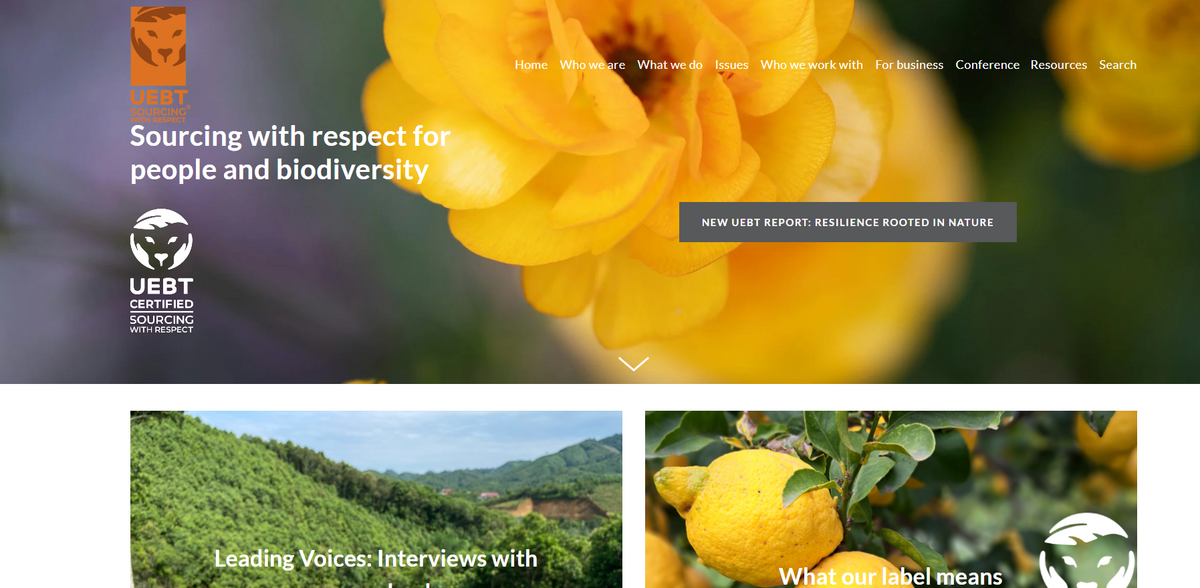What Is UEBT: Sourcing with Respect?
UEBT: Sourcing with respect is an international non-profit that champions sourcing with respect for people and biodiversity in diverse sectors such as beauty and personal care, herbs & spices, botanical beverages, natural flavours, and natural pharma. Born from a strong commitment to ethical practices, UEBT sets the stage for companies to source botanicals and other natural ingredients mindfully… without compromising the well-being of people or the environment. This initiative is all about forging a sustainable future where every actor in the supply chain plays a role in safeguarding nature and its invaluable resources.
Main Benefit
- The global UEBT standard, a multi-stakeholder developed framework that is internationally recognised.
- Guidance to manage risks, enhance policies and practices, assess supply chains, and seize new opportunities for positive impact on both people and biodiversity.
- A focus on sourcing ethical ingredients from various production systems: wild collection, agroforestry, and agriculture.
- A comprehensive definition of botanicals that covers raw materials or compounds derived directly or indirectly from plants, animals, fungi, or microbial organisms.
- A rich legacy that evolved from historic UN initiatives like the Rio Earth Summit and the UN Conference on Trade and Development’s BioTrade Initiative.
Our Vision & Mission
The vision is a world in which all people and biodiversity thrive—a goal that supports the UN Sustainable Development Goals and the UN Global Biodiversity Framework. The mission drives efforts to regenerate nature and secure a better future for people through ethical sourcing of ingredients from biodiversity. At its core, this vision and mission remind every stakeholder of the importance of careful, responsible trade that honors both nature’s bounty and human dignity. It’s a call to action, urging everyone involved in botanical sourcing to think long-term and embrace sustainability as a way of doing business… naturally and responsibly.
Defining Botanicals
Botanicals, as defined by UEBT, are the raw materials derived from components of biodiversity. These include various materials or compounds derived directly or indirectly from plants, animals, fungi, or microbial organisms. For instance, plant parts such as flowers, leaves, roots, stems, fruits, or bark are all included, as are plant-based oils, butters, waxes, extracts, flavours, fragrances, and colourants. Even plant cells, microorganisms, algae, and beeswax find a place under this umbrella. This comprehensive definition ensures that every relevant natural substance is considered within ethical sourcing practices—keeping the approach broad, inclusive, and dynamic.
History and Evolution
UEBT’s journey began as a result of strong UN initiatives aimed at promoting business engagement in the ethical sourcing of ingredients from biodiversity. The story kicked off at the Earth Summit in 1992 in Rio de Janeiro—the United Nations Conference on Environment and Development. At this landmark event, 150 nations committed to conserving and sustainably using biological diversity for the benefit of present and future generations. Then, in 1996, the UN Conference on Trade and Development (UNCTAD) launched a BioTrade Initiative, which further supported the objectives of the Convention on Biological Diversity through international trade and investment. A few years later, UEBT emerged as a business-focused biodiversity initiative under UNCTAD. In 2008, the organization transitioned out of the UN system and established itself as an independent non-profit, registered in Switzerland and with headquarters in the Netherlands. This evolution reflects a journey of growth, continuous improvement, and steadfast dedication to biodiversity, all fueled by international collaboration and passion for ethical sourcing.
Focus on Sourcing with Respect
The core purpose of UEBT’s work is embodied in its global sourcing system known as “Sourcing with Respect.” This standard details practices on how companies can ethically source botanical ingredients while ensuring respect for people and biodiversity. Developed with input from various stakeholders and internationally recognised, the standard encourages companies to improve their policies and practices. It provides a robust framework which helps these companies not only manage associated risks but also seize opportunities for a positive influence on the environments and communities in their sourcing areas. With a clear focus on ethics, UEBT’s approach paves the way for a more responsible, transparent, and sustainable botanical trade.
The Project Impact
- UN Sustainable Development Goals
- UN Global Biodiodiversity Framework
Global Presence and Contacts
UEBT’s operations span the globe—with its secretariat located at De Ruijterkade 6, 1013 AA Amsterdam, the Netherlands. The organization enjoys a strong partnership with the UN Convention on Biological Diversity and maintains local offices in several countries. Offices can be reached in Brazil (brazil@uebt.org), Bulgaria (bulgaria@uebt.org), China (china@uebt.org), India (india@uebt.org), Madagascar (madagascar@uebt.org), Türkiye (turkey@uebt.org), and Vietnam (vietnam@uebt.org). For financial administration, correspondence is handled by CR Gestion et Fiduciaire SA at Rue de l’Est 8, CH-1207 Geneva, Switzerland. More details, including general inquiries, can be directed to info@uebt.org or via telephone at +31 20 22 34567. This global footprint ensures that UEBT remains at the frontline of ethical sourcing, continuously fostering relationships that honor both biodiversity and community welfare… connecting people across continents in the shared pursuit of a sustainable future.






















